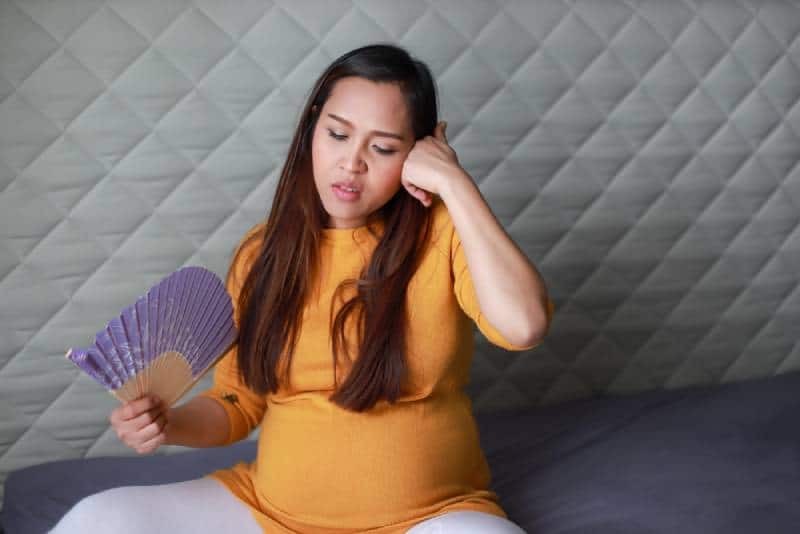Hot flashes in pregnancy can be potentially dangerous if your body temperature remains raised for longer periods of time.
Luckily, they’re not a frequent occurrence, but when hot flashes in pregnancy do happen, it puts your unborn child at risk of potential neural tube defects.
This means that his spinal cord and backbones are going to have problems in development while he grows inside the uterus.
But why does it happen?
Well, it’s mostly because of the actual pregnancy, namely the rapid pregnancy hormone level fluctuations, especially estrogen.
These hormonal changes elevate the body temperature ever so slightly above normal, causing you to feel flushed with heat or that maternal glow that pregnancy is so famous for.
But that’s not all. The changes in your hormone levels also make your blood flow faster due to the blood volume expanding, because more is needed to get oxygen and nutrients over to both you and the baby.
And, blood flow is then increased to help normalize the blood pressure to accommodate for the extra passenger for the coming months.
For first time moms, this might be a bit of a scare and they might think that something is wrong, but it’s pretty normal to experience this throughout pregnancy.
All pregnant women do, after all, and in isolation, it’s not too bad. But when coupled with some other aspects of pregnancy like morning sickness or insomnia, it can feel like a complete nightmare.
So what can we do about it and how can we help lower the impact hot flashes early in pregnancy have on us? Let’s talk about that right now, why don’t we?
What It Means To Have Hot Flashes During Pregnancy

Hot flashes are usually one of the most obvious signs of pregnancy.
It’s one of the early pregnancy symptoms that acts as nature’s own pregnancy test and symbolizes the start of your first trimester of pregnancy.
If you’re experiencing hot flashes, you’re likely to feel slightly feverish at times, sweat a lot more, and perhaps even experience some night sweats when sleeping.
Night sweats are essentially the same thing as hot flashes with the exception of the time at which they happen – they are likely to wake you up during the night if they get particularly intense.
It all serves the function of helping pump blood faster, which, in turn, makes your heart beat faster and may lower your blood sugar levels, especially during early pregnancy and the first trimester where the hormonal changes are the most noticeable.
And, when your heartbeat quickens, your body temperature rises ever so slightly due to the extra required energy to pump all that blood.
It somewhat mellows out during the second trimester, but picks back up in the third trimester as your due date starts approaching, usually anywhere between the 33rd and 35th weeks of pregnancy.
It also becomes a lot more apparent as the baby grows, making pregnant women experience hot flashes that become progressively harder to deal with.
That said, it’s not going to be exclusive to the pregnancy. There’s one more phase of your life where hot flashes are going to be the norm and that’s when you hit menopause – when your ovulation cycles stop.
They’re the most telltale sign that you’re hitting that transitional period when the “gates” close, in a sense.
What Does Having A Hot Flash Feel Like?
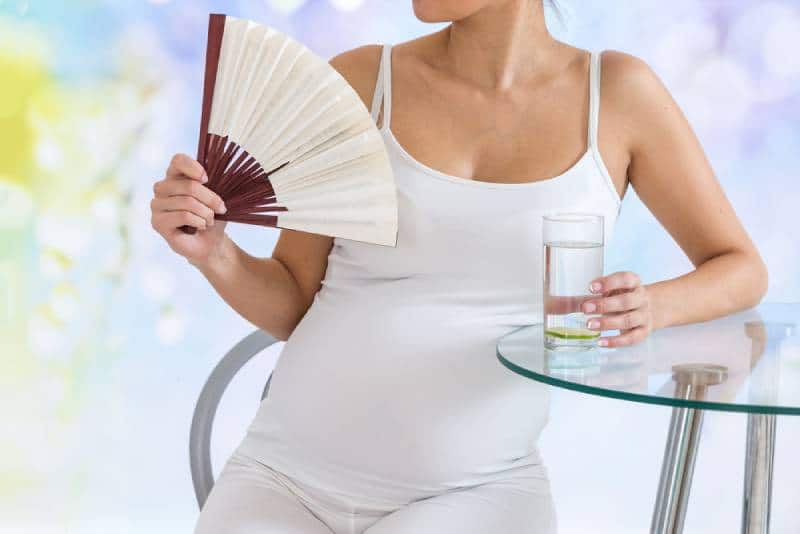
Speaking from experience, hot flashes are generally very easy to pinpoint.
You’ll start to feel warmer as the heat gets ready to get expelled from your body.
Your skin will blush and turn a brighter shade of red, depending on the intensity.
The most affected parts are your head, neck, and shoulder areas.
If it’s a particularly intense hot flash, you’ll also start breaking out in a bit of a sweat.
Your heartbeat is likely to become quicker as well.
And, as it happens, you might start feeling somewhat antsy and anxious during the episode which is a very unpleasant feeling for anyone, especially a pregnant mother.
And finally, the more intense your hot flash gets, the bigger the after-effect is going to be. One where, due to all of the expelled heat, you feel that unnerving cold creep in as the remainder of your warmth pulls back toward your vital organs.
Side Effects Of Hot Flashes In Pregnancy
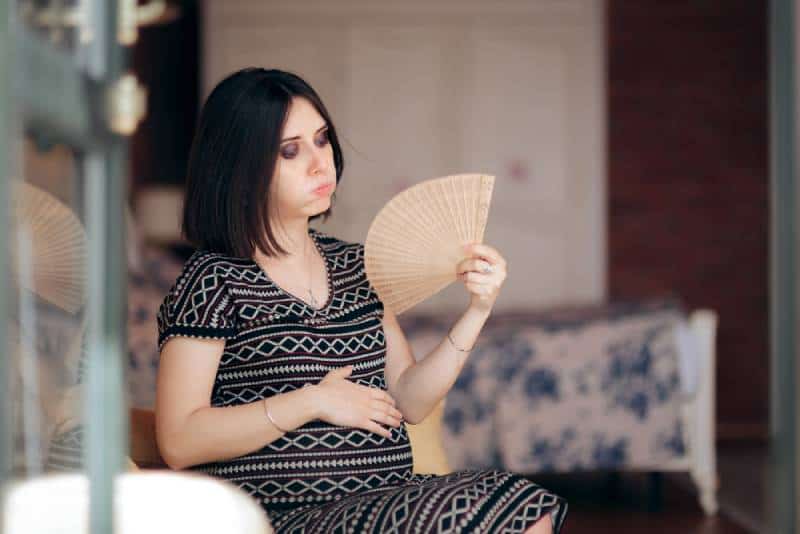
While hot flashes themselves are generally harmless when it just comes down to night sweats, there are some risk factors if you don’t take proper care of yourself.
Things like:
- dehydration
- diarrhea
- high fever
- nausea
- aching muscles
- flu-like symptoms
- constipation
On top of all of these, your main concerns should be heat exhaustion and an increased chance of suffering from heat stroke, especially during the warmer months, so make sure to stay inside.
What Causes Hot Flashes?

The main culprit, as previously mentioned, are the ever-present and rapid hormonal changes your body goes through during the first trimester and later on during the last trimester.
Though, there are some triggers that vary from person to person and the individual women’s health.
It’s usually best to keep track of it yourself so you can narrow it down, because the list gets pretty broad otherwise.
Some of the most common accelerants for hot flashes are:
- spicy foods
- wearing tight clothing that doesn’t let the skin breathe
- stress and anxiety
- coffee, caffeine, teas, and other hot drinks
- being in a warm room
- smoking
- your BMI (body mass index)
As you can see, many of these are things we come across in our day-to-day lives and things we generally don’t automatically attribute to causing hot flashes.
But, they do tend to affect our body in small ways that, when added up, make the feeling more unbearable than normal.
How To Deal With Hot Flashes During Pregnancy
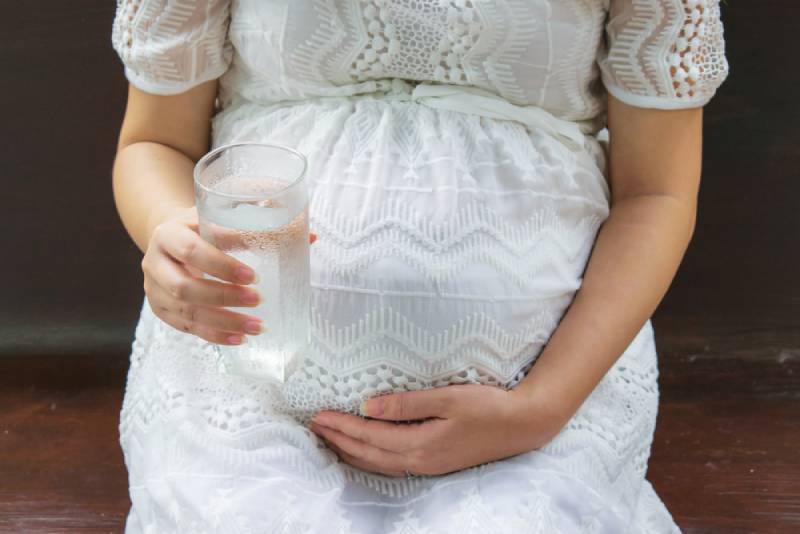
Well, if you experience hot flashes in pregnancy, it’s best to go toward the most obvious solution that comes to mind and that’s to keep cool.
And some of the best advice would agree with that notion.
1. Stay hydrated because of all the expelled sweat and to keep the body cool. Always make sure to have a bottle of cold water with you.
2. Stay away from other heat sources like direct exposure to heaters or lingering near stove tops or furnaces.
3. No heavy exercise – keep it light.
4. Avoid non-ventilated spaces and exercising outdoors, especially in the warmer months.
5. A temporary fix is to splash some cold water on the affected areas to keep yourself cool.
6. Avoid using heat pads or warm compresses when you need to relieve the aching muscle pain. Instead, opt for a massage from your partner or get one booked.
7. Prepare a nice, slightly cool bath or have a cool ( not cold) shower to help refresh your body without giving it a temperature shock.
8. Soak your feet in cool water, as extremities are usually the parts of the body that expel the most heat.
9. Make sure your bedroom is well ventilated and kept at a cool, comfortable temperature at night to minimize the chances of night sweats.
10. Reduce the amount of layers when sleeping. This means thinner, airier pajamas, as well as less bedding and lighter blankets.
11. Wear looser, more airy clothes. Avoid tight clothing that sticks to you, not allowing proper blood circulation or heat expulsion.
12. Limit your exposure to the sun during the warmer periods of the year to lower the risk of heat exhaustion, dehydration and heat stroke.
13. When going outside, wear some skin protection like sunscreen or at least a hat to cover your head.
14. Keep a damp towel or wet wipes handy to help refresh yourself quickly.
15. Protect yourself from the sun with an umbrella to create some shade for you to walk around outside if you really have to.
16. Always keep your skin covered to reduce the area where the skin is sun-exposed.
17. Make sure all your clothes are made of a breathable fabric. Think cotton, linen, and other non-synthetic materials.
18. Avoid any potential hot flash triggers that you’ve noted (either listed above or ones specific to you).
As you can see, there are plenty of little tips that you can implement through just a few simple lifestyle changes that are going to end up making it so much more comfortable when dealing with hot flashes in pregnancy.
If you want more specific pointers, then talking to your gynecology or obstetrics practitioner or any other qualified healthcare provider who understands the body of a pregnant woman is going to be more fruitful.
They’ll be able to study your case first-hand and prescribe you the proper diet and lifestyle changes to minimize the impact of hot flashes.
This way you’ll have to deal with much less postpartum recovery problems yourself.
The Silver Lining

While hot flashes in pregnancy rightfully aren’t exactly the best thing to have to deal with, that little bit of extra heat helps serve as a mock incubator for the child, helping him develop in a much healthier manner.
It’s generally considered that babies who develop in utero during the warmer months and those born in warmer climates tend to be taller and heavier than babies who are not.
To Sum It All Up
Hot flashes in pregnancy aren’t a novelty by any means. In fact, they’re a very common occurrence.
The first time you experience them, unless there’s something wrong with your thyroid gland or you’re suffering from a side effect of a specific drug, it’s likely a sign that you’ve finally begun your pregnancy.
After that, you’ll get your fair share of them in your first trimester as your hormone levels go wild, causing all sorts of other challenges.
Luckily, the second trimester gives pregnant women a bit of a reprieve as the hormones simmer down a bit. The grace period lasts until the third trimester hits.
That’s when it all comes back as the body slowly starts preparing to deliver the baby and the hormone levels are again all over the place.
You’re likely to experience them for a bit longer postpartum and sometimes even when breastfeeding your newborn, but they should fade within a week or two.
And that should be your last encounter with hot flashes for a long while – well, until your next pregnancy or when you hit menopause.
The best piece of advice I can give you is to not make too big of a deal about them, as added stress is only going to produce more of an issue than it really is.
That, and to stay hydrated, stay in properly ventilated and cooled areas, and steer clear of the outdoors as much as you can during those hot summer months.
Outside of that, living a generally healthier lifestyle and avoiding trigger foods is going to help you out immensely.
If you suffer any further complications outside of the normal symptoms, immediately contact your OB/GYN or general healthcare provider because there might be some other underlying issue present and they may need to intervene.
Well, that’s it for today, mamas. Stay safe and I hope that what you’ve learned today helps you out in your journey to motherhood.
Like this post? Please share or pin it for later. You can also stay in the loop and follow us on Facebook, Instagram or Pinterest.
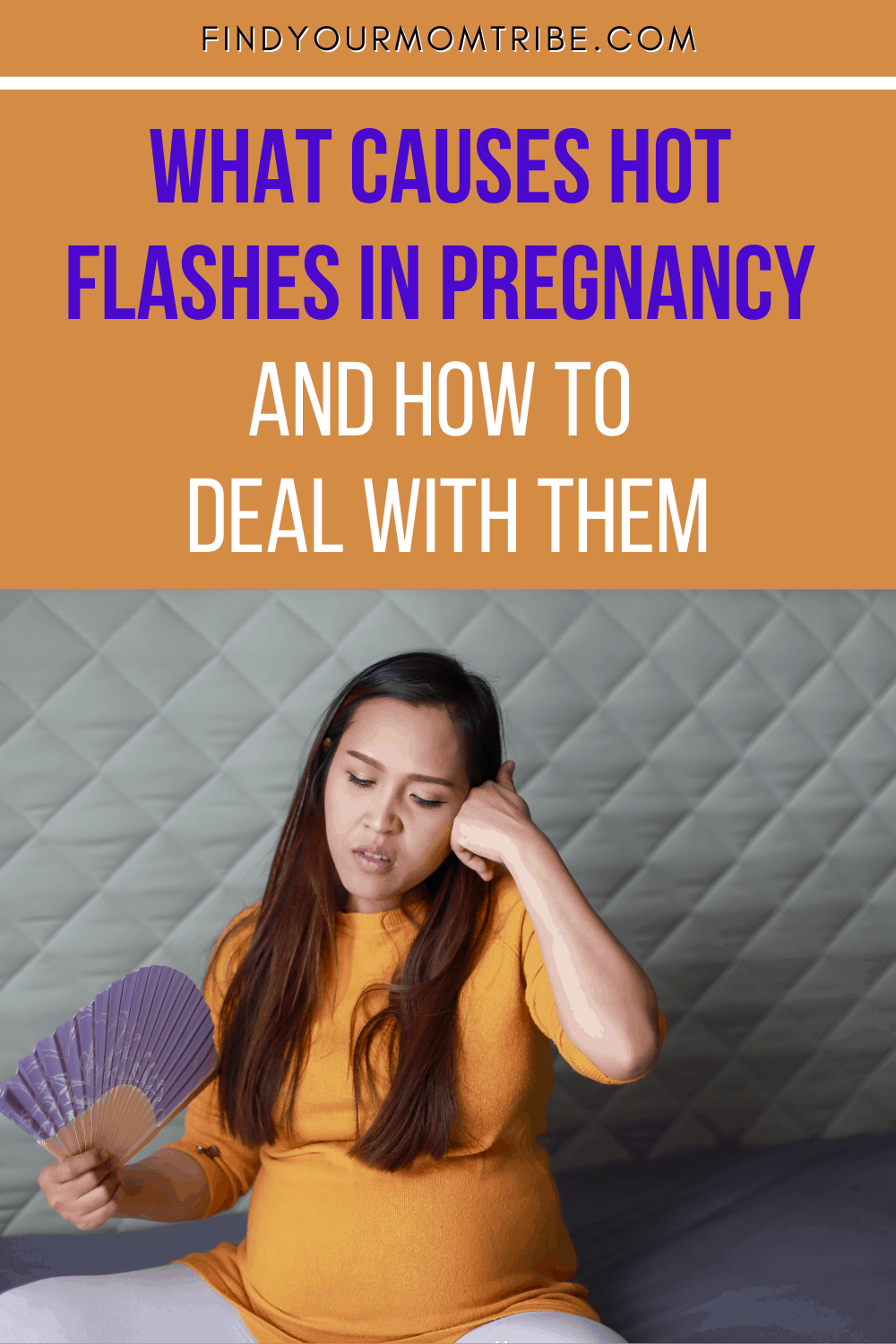
This post contains affiliate links. Please see our full disclosure for more info.

